Business
Enugu Modern Transport Interchange: Payment of compensation to Holy Ghost property owners begins .
Published
11 months agoon
By
Ekwutos Blog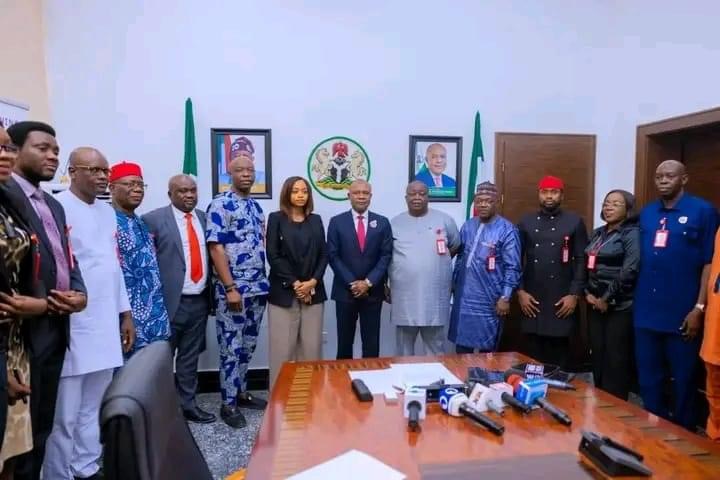
Ahead of the commencement of construction of a new and modern transport Interchange (bus terminal) at Market Road, Enugu (Enugu Central Station), popularly known as Holy Ghost, the leaser of properties at the site will, from Tuesday, start receiving their compensations as agreed with the Nigerian Railway Corporation, the lessor.
The commencement of payment was made known to the Enugu State Commissioner for Transportation, Dr. Obi Ozor, on Monday.
Recall that the Enugu State governor, Dr. Peter Mbah, had, on 19th October, 2023, met with critical property owners and stakeholders on the proposed Enugu Central Station. At the meeting, Mbah had explained that the proposed Enugu Central Station was part of the larger infrastructure plan, which also includes other major modern transport interchanges at Garki, Abakpa Nike, and Nsukka. The aim, he said, was to alleviate the perennial traffic congestion, enhance safety, preserve road assets, optimise transport efficiency, and address various needs of transport sector operators in the state. He, therefore, sought their cooperation towards the realisation of the project.
Citing similar world-class developments in other parts of the world like Dubai, and Singapore, among others, Governor Mbah said there was no reason Holy Ghost bus terminal could be allowed to continue in its present state of decay, perennial traffic congestion, and high-level crimes when such overseas feats could be replicated through conscious efforts and planning.
Sequel to the meeting, the Commissioner for Transportation had on 20th October, 2023 letter formerly notified each individual occupant over a six-month notice of the government’s intention to use the location, while the lessors, the Railway Property Management Company Ltd. equally served the leasers notices of recovery of property to the on 22nd April, 2024 in line with their term of the lease.
In a copy of one of the letters by Railway Property Management Company Ltd. entitled “Notice of Recovery of Railway Land Along Market Road, Enugu”, referenced as T/P. 1794/VOL.1, signed by the Director of Land and Estate Services, A.O Abdulsalam, for the company’s Managing Director, it said the Federal Ministry of Transportation had agreed to release the said portion of Railway land to the Enugu State Government for a modern bus terminal.
The letter reads in part: “We refer to your lease of Railway land along Market Road, Enugu with Ref. No. T/P. 1794/VOL. 1 dated 02/08/2017.
“Please, be informed that the Federal Ministry of Transportation, on behalf of the Federal Government has agreed to release the portion of the NRC land, which was earlier allocated to you as referenced above, to the Enugu State Government to construct a modern transportation hub under the Transport Infrastructure Project.
“In line with our contractual agreement, the Enugu State Government has agreed to compensate you for the structures (s) constructed on the land based on an independent valuation of your structure on the land.
“Therefore, you are kindly requested to provide us with your account details through our Enugu Zonal Manager on or before 26th April 2024 to enable the Enugu State Government to credit your account with the necessary payment.
“Furthermore, as a kind gesture, the Enugu State Government has agreed to do the following: To provide you with an alternative temporary location to ease your business pending when the project is completed; to also give you the right of first refusal to return to the newly completed structure.”
Throwing more light on the development, Enugu State Commissioner for Transportation, said the temporary places had since been allocated to the affected businesses, with some already developing the new place.
“But importantly, I can say with certainty that they will start receiving alerts latest from Tuesday based on the compensation advisory sent to the state government by the Nigerian Railway Property Management Company Ltd. These are huge sums of money, but we have to do it to ameliorate the temporary inconveniences,” Ozor stated.
Meanwhile, at the meeting with Governor Mbah last year, the property and business owners, in addition to legitimate tenants numbering over 29, commended the project.
The event was attended by the owners and representatives of Anaocha South Mass Transit, Chisco Transport Company, Onitsha South Mass Transit, Farm Associates Limited, Dozie Oil Limited, A.C. Decanal Limited, Harco Oil, Pilgrimage Sisters (Osisatech), Okeyson Transport Limited, MDS Logistics Limited, Beach Crushers Association, FCMB, and Ecobank, among others.
Also, during a visit to Mbah in November to better know the project, the Chairman/CEO of Chisco Transport, Chief Chidi Anyaegbu, lauded Governor Mbah for taking responsibility to build such an important transport…
You may like


Police arrest singer Portable over alleged criminal defamation


Nigeria does not deserve leader like Tinubu – Atiku on US court order to FBI
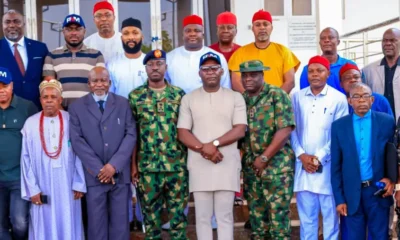

Army decries poor enlistment from SE, urges youths to join military
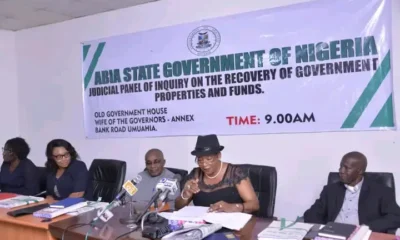

Abia Judiciary Panel investigates alleged demolition of school building for NALDA project


DISCLAIMER: FEDERAL CIVIL SERVICE COMMISSION DISOWNS FICTITIOUS CANDIDATES’ SHORTLISTS


WHAT PRESIDENT TINUBU DISCUSSED WITH US PRESIDENT TRUMP’S ADVISOR
Business
Nigerians score CrediCorp, power, agric ministries low
Published
22 hours agoon
April 13, 2025By
Ekwutos Blog
Nigerians have rated the Ministries of Power and Agriculture and Food Security low on the Presidency’s Central Results Delivery Coordination Unit tracker, Sunday Ekwutos reports.
Data obtained by our correspondent from the tracker also revealed that the Ministry of Interior topped the chart, buoyed by multiple five-star reviews applauding improvements in passport and visa issuance.
On April 8, 2024, the Special Adviser to the President on Policy and Coordination and head of the CDCU, Hadiza Bala-Usma, inaugurated the Citizens’ Delivery Tracker.
Bala-Usman said the tracker would provide a “strong feedback loop” between citizens and the government and hold ministers and heads of government agencies accountable based on key deliverables.
“The Citizens Delivery Tracker App…will be constantly modified to enhance ease of use and maintain a strong feedback loop between citizens and their government,” she explained at the Go-Live event of the CDT in Abuja.
According to the latest CDCU data covering the last six months, citizens submitted 217 ratings overall, with an average of 3.1 out of 5 stars across agencies.
“The Ministry of Interior led with an average of 4.3, while the lowest-rated agency, the Nigerian Consumer Credit Corporation, recorded 1.7,” the report read.
Tinubu’s eight priority areas
The deliverables border on the eight priority areas of the Bola Tinubu administration.
The CDT outlined 204 deliverables and 888 indicators to assess government ministries, departments and agencies. The deliverables comprised various government policies, projects and programmes scheduled for completion between 2024 and 2027.
In arriving at the deliverables and key performance indicators, Bala-Usman said the CDCU, supported by development partners and consultants, held numerous bilateral meetings with all the ministers, permanent secretaries, and their respective technical teams for six weeks.
The tracker came months after President Bola Tinubu announced plans for ministerial assessment at the cabinet retreat in November 2023.
At the cabinet retreat for ministers, presidential aides, permanent secretaries and top government functionaries, Tinubu said the CDCU would be strengthened to make citizens an integral part of his government’s monitoring and performance management process.
Direct citizens’ feedback
A summarised breakdown of the feedback availed to Sunday Ekwutos indicated that fertiliser and other inputs did not get to real farmers because of the absence of a proper database.
“I suggest there should be agric extension workers across the 774 LGAs to collate the data and support; that way, genuine farmers will be reached, not paper ones,” Damilola Ogidan, who rated the Ministry of Agriculture and Food Security 2 out of 5, said.
Another respondent, Aimufua Emmanuel, in his rating of the Federal Ministry of Power, wrote, “Your excellency, I don’t know what we have done to God to give us a man like the power minister to take charge of the power sector. He’s by far the least performing minister in your cabinet. Ever since the beginning of this administration, our case has been from frying pan to fire. I live in Sangotedo, and since May last year, we have never had four hours of light in a day. At times we go one week without light blinking for a second, it is very obvious the power minister knows nothing about the power sector, listen to him and you’ll be quick to tell he knows nothing about generation, transmission and distribution of power. This man is clueless.’ He rated the Ministry of Power 1 out of 5.”
However, another Nigerian, Nasir Abubakar, rated the Power Ministry 4 out of 5.
He advised that there should be legislation that would compel power distribution companies to supply electricity to consumers and they should be responsible for the repairs and maintenance of their equipment.
The report continued: “One user, Lukman Kazeem, rated CrediCorp one star, commenting, ‘No indication that this agency is performing. No projects in the project list.’ The Delivery Manager for CrediCorp responded to clarify the agency’s status and ongoing initiatives.
“Oluwafemi Olanrewaju gave the Ministry of Interior five stars, commending ‘the improved processing time for visa issuance,” a key deliverable tied to the ministry’s priority.
“Feedback on the Federal Inland Revenue Service ranged from top marks to mid-level scores. Suleiman Umar rated the FIRS five out of five, stating, ‘I support Zach on his revenue reform…all MDA’s generating revenue should use FIRS account such that they don’t touch the revenue. Let’s have a centralised system of revenue collection.’”
“Segun Owolabi rated the FIRS three out of five, citing issues with taxpayer data: ‘The stats of captured taxpayers across Nigeria has not been consistently updated… many low-income earners are being taxed by their employer even when the law stipulates taxable and nontaxable income.”
CrediCorp recorded the lowest rating, averaging only 1.7 stars.
In the same timeframe, Priority 6—covering Health, Education, and Social Investment—achieved the best performance (74 per cent), while Priority 4—concerning Energy and Natural Resources—posted a comparatively lower figure (53 per cent).
During this period, delivery managers maintained an average response time of 3.2 days, with 30 actively engaging citizen feedback and resolving about 76 per cent of submitted issues.
The CDCU noted that the tracker’s 1 to 5 stars rating system was linked to verified performance indicators for each deliverable.
It encouraged citizens to rate and leave contextual feedback, which ministry representatives would address.
Business
PETROLEUM MINISTRY AND THREE AGENCIES UNDER ITS SUPERVISION PARTICIPATE IN IMF ARTICLE IV CONSULTATION
Published
2 days agoon
April 12, 2025By
Ekwutos Blog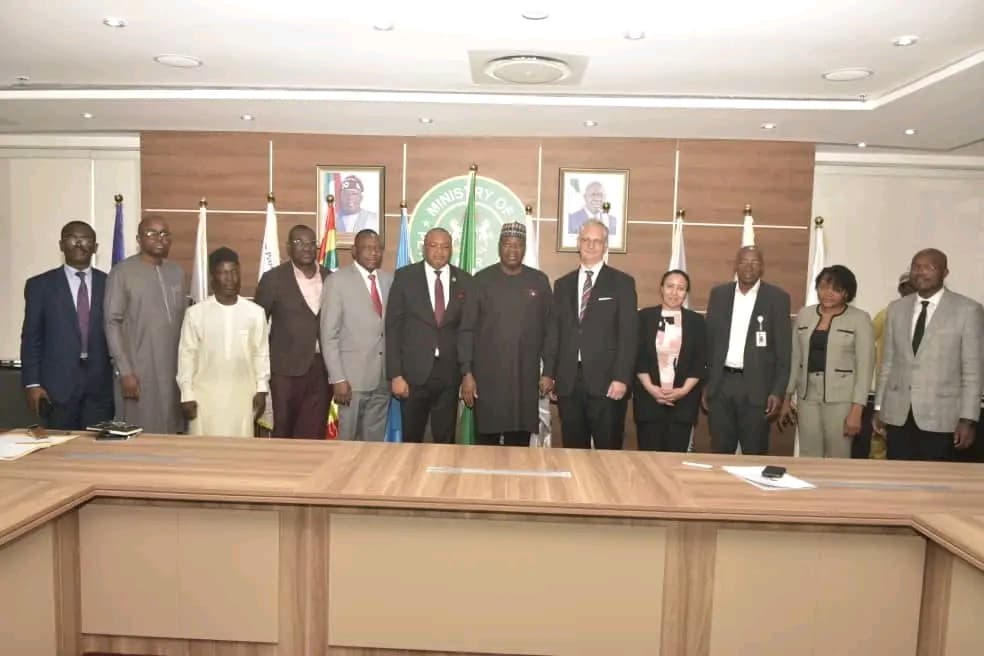
The Ministry of Petroleum Resources (MPR), alongside three agencies under its supervision—the Nigerian Upstream Petroleum Regulatory Commission (NUPRC), the Nigerian Midstream and Downstream Petroleum Regulatory Authority (NMDPRA), and the Nigerian National Petroleum Company Limited (NNPCL), recently participated in the ongoing International Monetary Fund (IMF) Article IV Consultation in Nigeria.
The IMF team was in the country at the invitation of the Federal Government to engage selected government institutions and gather insights on developments across various sectors of the economy.
Speaking during the meeting held in Abuja, the Chairman of the session and Permanent Secretary of the Ministry of Petroleum Resources, Ambassador Nicholas Agbo Ella, expressed appreciation to the IMF team for their continued efforts and commitment to the growth and development of the Nigerian economy, particularly the oil and gas sector.
Ambassador Ella encouraged representatives of NUPRC, NMDPRA, and NNPCL to engage fully in the consultation, stressing the importance of collaboration and innovation in achieving tangible economic outcomes.
During the meeting, the three agencies delivered comprehensive presentations, offering valuable insights into Nigeria’s crude oil production trends and projections. It was highlighted that despite prevailing challenges, the country achieved an average of 88% of its projected crude oil volume, attributed to reduced losses and increased output. Efforts are also underway to revive underperforming assets and improve output from flow stations to terminals.
Regarding gas production, the presentations underscored existing infrastructure developments and ongoing investments aimed at achieving production and distribution targets.
A significant part of the consultation examined the recent fuel subsidy removal by President Bola Ahmed Tinubu and the strategies being employed to ensure its long-term sustainability. Discussions reflected a shared commitment to market-driven reforms and enhanced fiscal responsibility within the petroleum sector.
Participants at the meeting agreed that strong inter-agency collaboration, along with support from development partners and financial institutions, is essential to stabilize global oil markets and strengthen Nigeria’s energy security.
The meeting was attended by Directors, Heads of Units, and staff from the Ministry of Petroleum Resources, representatives from the Federal Ministry of Finance, and IMF consultants.
This successful engagement reaffirmed Nigeria’s strategic commitment to transparency, sustainable growth, and international cooperation in the petroleum industry.
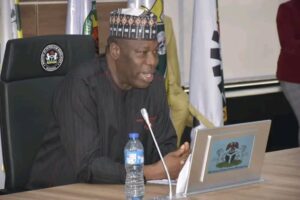


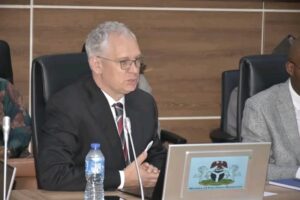
Business
AFDB REAFFIRMS $2.2 BILLION PLEDGE AS VP SHETTIMA COMMISSIONS 2ND SAPZ IN CROSS RIVER ** Says agro-industrial processing zones will empower farmers, attract investors, diversify Nigeria’s economy
Published
3 days agoon
April 10, 2025By
Ekwutos Blog
STATE HOUSE PRESS RELEASE
AFDB REAFFIRMS $2.2 BILLION PLEDGE AS VP SHETTIMA COMMISSIONS 2ND SAPZ IN CROSS RIVER
** Says agro-industrial processing zones will empower farmers, attract investors, diversify Nigeria’s economy
The federal government has commenced construction of the Special Agro-Industrial Processing Zone in Calabar, Cross River State, as part of a nationwide drive to transform the agricultural sector and stimulate inclusive economic growth across Nigeria.
This is the second of such a facility initiated within 72 hours after Vice President Kashim Shettima had on Tuesday performed the groundbreaking ceremony for the construction of the Kaduna State SAPZ in the Chikun local government area of the state.
Already, the AfDB_Group has reaffirmed its commitment to mobilising an additional $2.2 billion to execute the second phase of the SAPZ project across 28 states in Nigeria.
Speaking on Thursday when he performed the groundbreaking ceremony of SAPZ in Calabar, the Vice President described the project as “a game changer” that aligns with the President Tinubu administration’s Renewed Hope Agenda, aimed at diversifying the nation’s economy, addressing food security, tackling rural unemployment, as well as empowering farmers and the youth population.
“There is no intervention more practical in our dream of a nation where the potential of agriculture is maximised than what’s brought us together today. This isn’t just a project—it’s a bold vision to transform Nigeria’s agricultural value chain,” VP Shettima said.
According to him, the SAPZ initiative, supported with counterpart funding from development partners and the private sector, is designed to address challenges that have long hindered the growth of Nigeria’s agricultural economy, including inadequate processing infrastructure, limited access to markets, and rural unemployment.
“For far too long, our farmers have contended with poor infrastructure, lack of access to finance, and inadequate processing facilities. This zone is designed to confront those challenges head-on by creating an ecosystem where innovation, investment, and collaboration thrive,” he noted.
VP Shettima explained that the Calabar SAPZ will serve as a hub for agro-processing and storage, providing farmers and agripreneurs with critical infrastructure to scale their operations and tap into local and international markets.
“This is where farmers will meet with private investors, where ideas will turn into enterprise, and where our youth will find meaningful opportunities,” he said, disclosing that the Tinubu administration has classified SAPZ as a priority program in Nigeria’s quest for food security, with plans to institutionalize it as a government agency that will facilitate agricultural industrialization across all 36 states.
“These zones will generate thousands of jobs. They will create opportunities for young people, empower them with skills and knowledge to engage in meaningful work and help them contribute positively to the economy. Cross Riverians, development has come to your doorstep. For you and for the country, SAPZ is a game changer—one that will enable Nigeria to diversify its economy with a sustainable source.,” he stated.
Senator Shettima also expressed gratitude to key international development partners, including the African Development Bank, the Islamic Development Bank, and the International Fund for Agricultural Development, for their support and belief in Nigeria’s vision.
The Vice President commended Cross River State Governor, Senator Prince Bassey Edet Otu, for his collaboration, describing him as “a critical foundation for the success of this intervention and a great ally in development.”
Earlier, Cross River State Governor, Senator Otu, said the programme marked a watershed in the ongoing bid by his administration to establish the renewable resource base of the state through the full utilisation of agriculture and its multiple value chain.
Otu pointed out that in Cross River State, the establishment of a cluster of smallholder farmers in cash crops such as rice, cassava, millet, and cocoa across the state is the right step towards the agro-industrial revolution.
He said the paradigm shift from a non-renewable to a renewable resource base also holds the key to the prosperity of many nations, hence the imperative to join the league of sub-nationals in Nigeria that have adopted agriculture as the mainstay of their economy.
“The deliverables of the envisaged projects are food security, diversification of the state economy towards export-oriented trajectory and increase in the State’s GDP. When these projects are fully operational there is an expected robust collaboration with reputable agro-based processing institutes, universities and the rest, aimed at accelerating breakthroughs in many agro-industrial production.”
Also, Minister of Agriculture and Food Security, Senator Abubakar Kyari, said the programme would transform the agricultural production and agro-investment landscape in Nigeria under the Renewed Hope Agenda of President Tinubu.
Kyari thanked Vice President Shettima for his leadership and political backing at the highest level in the implementation of the SAPZ in Nigeria, just as he also commended the Governor of Cross River State for his commitment to ensuring that the state is among the front-running states that will commence the construction of their Agro-Industrial Processing Hub.
In his remark, President of AfDB, Dr Akinwumi Adesina, reiterated the bank’s pledge to mobilise $2.2 billion to execute the SAPZ project in 28 states across Nigeria.
Adesina observed that Cross River State has a significant role to play in Nigeria’s agricultural transformation because of the vast production of cocoa, cassava, rice and banana in the state, saying Obudu Cattle Ranch alone can turn the state into a huge livestock producer.
He also acknowledged that the state is ideal for SAPZ because it has an export processing zone, ports facility, and export handling capabilities, adding that the SAPZ in Calabar can easily be linked to the seaport for the transportation of processed agricultural commodities to the export market in neighbouring countries, including Cameroon and the rest.
“The African Development Bank, as you know, is spearheading this together with our partners, which include the Islamic Development Bank and the International Fund for Agricultural Development, and we have put together $934 million from the African Development Bank, with core financing of $938 million from these partners.
“The first phase of SAPZ in Nigeria will be in eight states of Cross River, Kaduna, Kano, Katsina, Oyo, Ogun, Kwara, Imo and the Federal Capital Territory. We are delighted with our partnership with the Islamic Development Bank and the International Fund for Agricultural Development.
“We have put together a financing package of $510 million to make this work. We expect, in the second phase of this, to mobilise $2.2 billion to be able to work for 28 states across the federation with several partners,” the AfDB President said.
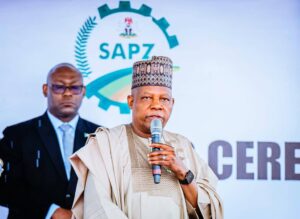

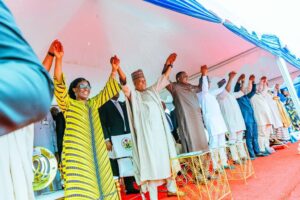
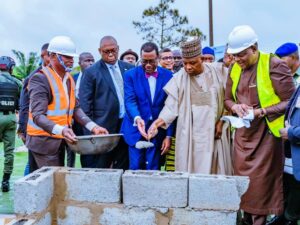

Stanley Nkwocha
Senior Special Assistant to The President on Media & Communications
(Office of The Vice President)
10th April, 2025

Police arrest singer Portable over alleged criminal defamation

Nigeria does not deserve leader like Tinubu – Atiku on US court order to FBI

Army decries poor enlistment from SE, urges youths to join military
Trending

 Trending6 months ago
Trending6 months agoNYA demands release of ‘abducted’ Imo chairman, preaches good governance
- Business6 months ago
US court acquits Air Peace boss, slams Mayfield $4000 fine

 Politics6 months ago
Politics6 months agoMexico’s new president causes concern just weeks before the US elections
- Entertainment6 months ago
Bobrisky transferred from Immigration to FCID, spends night behind bars
- Entertainment6 months ago
Bobrisky falls ill in police custody, rushed to hospital

 Politics6 months ago
Politics6 months agoRussia bans imports of agro-products from Kazakhstan after refusal to join BRICS

 Politics6 months ago
Politics6 months agoPutin invites 20 world leaders
- Politics1 year ago
Nigerian Senate passes Bill seeking the establishment of the South East Development Commission.

